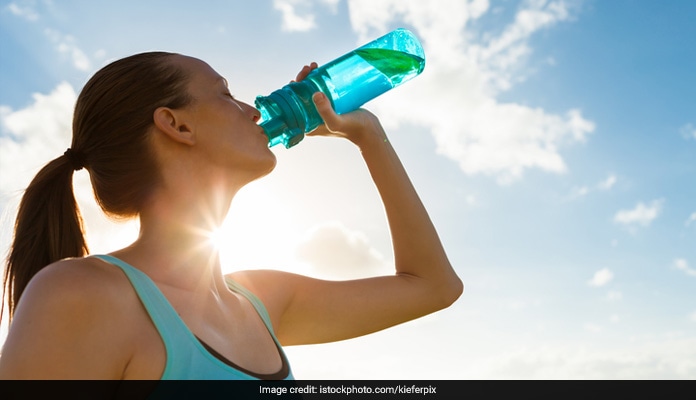Non-nutrients are those components of the diet which are not considered as nutrients. However, they play a vital role in our body.

Fibre and water come in the category of non-nutrients
HIGHLIGHTS
- Fibre and water are considered as non-nutrients
- Fibre is helpful in improving digestion
- Water is needed for all life processes and can help in weight loss
Non-nutrients are those components of the diet which are not considered as nutrients. However, they play a vital role in our body. You must have been given the advice, 'Consume lots of fibre, drink loads of water' umpteen number of times. Let's find out why...
Fibre: Dietary fibre or roughage is that part of the plant that cannot be digested in the small intestine and reaches the large intestine intact. In the large intestine, it is fermented by the bacteria to produce short chain fatty acids and gases.
Dietary fibre is found in fruits (pears, strawberries, blackberries, raspberries, oranges, pineapple etc.), vegetables (peas, green beans, broccoli, capsicum, bell peppers, spinach, eggplant etc.), pulses (lentils, chickpeas, beans) and whole grains.

Broccoli is rich in fibre
Photo Credit: iStock
Also read: Is Cabbage An Underrated Green Vegetable? Learn More About Cabbage Nutrition Facts
Dietary fibre includes cellulose, hemi-cellulose, pectins, oligosaccharides, lignin etc. Dietary fibre can be soluble and insoluble. Usually both types of fibre are found in different proportions in fibre containing foods.
The soluble fibre dissolves in water to form a gel like material. Good sources of soluble fibre include oats, barley, psyllium, flaxseeds, fruits, vegetables and pulses (beans, lentils, chickpeas). The insoluble fibre adds bulk and promotes movement of materials through the digestive system. Whole grain cereals, nuts, vegetables like cauliflower, green beans, are rich sources of insoluble fibre.
Also read: National Nutrition Week 2018: Lose Weight, Not Health!
The benefits of dietary fibre:
1. Insoluble fibre helps in preventing constipation by adding bulk to stools and reducing gut transit time. The impact of fibre is enhanced if there is a parallel increase in water intake.
2. By improving bowel function, dietary fibre reduces the risk of hemorrhoids, diverticular disease and possibly colorectal cancer too.

Fibre-rich foods are good for digestion
Photo Credit: iStock
3. Soluble fibre slows the digestion and absorption of carbohydrates, helps to lower blood sugar and insulin response; thus helps in better management and prevention of type 2 diabetes.
4. Various studies have shown that fibre helps to lower total cholesterol, LDL cholesterol and thus the risk of coronary heart disease.
5. Fibre adds bulk to the diet without adding calories, has a satiating effect, and thus helps in weight loss.
How much fibre do you need?
The recommended intake of fibre is 25-30 grams a day. To obtain both soluble and insoluble fibre, you must include a variety of whole grains, fruits, vegetables, beans, peas, legumes, nuts and seeds.
Refined and processed foods such as white breads, pasta, noodles, fruit and vegetable juices are low in fibre as the fibre and other nutrients are lost during refining and processing. Though some of the B vitamins are added back to obtain enriched flour, however, fibre isn't added back.
It is best to obtain your fibre from food. However, fibre supplements may become essential in medical conditions like constipation, hemorrhoids, diarrhea etc.
Adding too much fibre to your diet, suddenly, can lead to intestinal gas, bloating, and it also interferes with absorption of minerals. So gradually add fibre to your diet along with a parallel increase in water intake.
Also read: Celebrity Nutritionist Recommends 5 Simple Tips To Manage Diabetes
Water: Water is critical for sustaining life.
1. Water is essential for all life processes.
2. Water is needed to remove waste products, through urine, stools and sweat.

Water is essential for survival and good health
Photo Credit: iStock
3. Without sufficient water, fiber does no good. Fiber absorbs water thus allowing waste products to move freely through the digestive tract, thus preventing toxic waste from accumulating.
4. Water is a heat regulator. It helps the body temperature to stay the same.
5. Water helps you to feel full without adding extra calories, hence helps in weight loss.
Daily recommended intake of water is 8-10 glasses daily though it can vary. Water intake is higher if you exercise and in hot weather.
Besides plain water, clear soups, broths, stock, green tea/ herbal teas etc help to add up to your fluid intake. You can also make your own flavoured non-caloric water by adding a slice of lemon/ cucumber/ ginger etc, and spice infused waters, which have been suggested to have various health benefits. Fruit juices, carbonate beverages, colas and even 'diet' Coke are not advisable for obvious reasons.
So, don't wait to feel thirsty before you grab your bottle, as thirst is the first symptom of dehydration. Just keep sipping water throughout the day.
Disclaimer: The opinions expressed within this article are the personal opinions of the author. NDTV is not responsible for the accuracy, completeness, suitability, or validity of any information on this article. All information is provided on an as-is basis. The information, facts or opinions appearing in the article do not reflect the views of NDTV and NDTV does not assume any responsibility or liability for the same.
DoctorNDTV is the one stop site for all your health needs providing the most credible health information, health news and tips with expert advice on healthy living, diet plans, informative videos etc. You can get the most relevant and accurate info you need about health problems like diabetes, cancer, pregnancy, HIV and AIDS, weight loss and many other lifestyle diseases. We have a panel of over 350 experts who help us develop content by giving their valuable inputs and bringing to us the latest in the world of healthcare.














